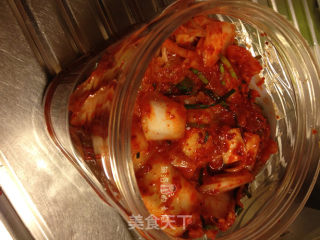Making Kimchi in Korea
1.
Cut the cabbage into pieces. Cut the bottom of the cabbage with a cross knife, remove the hard heel, cut into 4 portions, and cut into small cubes.
2.
The cabbage is soaked in water. After cutting the cabbage into the water, let the water dry.
3.
(Coarse salt. Use 50ml of coarse salt to pickle the cabbage, let the cabbage out of the water and taste, and the wilted cabbage will be more spicy.)
4.
3) Coarse salt pickling.
Sprinkle the coarse salt evenly, and turn it gently every 30 minutes, 3-4 times.
5.
(Look! Out of the water~)
6.
4) Rinse with clean water.
Rinse with clean water 3 times.
7.
5) Air dry moisture.
Empty water for 30 minutes to 1 hour.
8.
(Start making seasoning sauce! Towards this goal, set off!!! This step can be done after the cabbage has been marinated for 30 minutes, so don’t worry~)
9.
6) Make Jiangmi (glutinous rice) paste.
In a small pot: 30ml glutinous rice + 100ml water, heat on low heat, add a spoonful of sugar when it is about to become a paste
10.
(Probably it's shiny, pull it up, the shovel is pasted into an inverted triangle shape, ok! **The rice paste must be cooled!!! It can be cooled in cold water~)
11.
(Except for the rice paste, this is the remaining ingredients~)
12.
7) Crush onion, garlic, ginger, apple~
You can use a blender
13.
8) Cut the leek into sections.
About 4cm
14.
9) Cut white radish into thin strips. (In the Korean "Diner": "Autumn radishes are as sweet as pears~" It's time to eat radishes at this time. I used the middle section, maybe it will be sweeter?--.)
15.
10) Mix all materials. Don't forget to add fish sauce and rice paste~! **After mixing, leave it for about 30 minutes to let the chili powder fully absorb and soften it~
16.
11) Mix the seasoning sauce and cabbage, and you're done! Place it in an airtight jar. Leave it at room temperature for 1 day to ferment, and then store in the refrigerator.


Tips:
The third step (Picture 4): Flip gently! The more you turn, the more delicious. This simple kimchi is easy to taste, do not marinate for too long, 1-2 hours is appropriate.
The fourth step (Picture 6): Don't be selfish, you think that washing the cabbage too clean will be bland and tasteless! Not only will it be salty if it is not washed, it will also make the kimchi bitter~
Step 5 (Picture 7): Don’t use your hands to dry out the water, the cabbage will “dead”. If it doesn’t taste crispy, then it’s your responsibility~
Step 6 (Picture 9): 1. The "spoon" here is used for ordinary meals, 10ml is a flat spoon, wipe off the "pointy" along the edge of the spoon
2. Small fire. Because the amount is small, it will be cooked quickly; the fire is big and the glutinous rice paste is easy to clump
3. No sugar is more healthy. Using apples, pears, etc. instead of sugar will be healthier~ (My apples are not sweet, so I have to put some sugar in.)
(Picture 11): 1. In the Korean comic "Diner", two key points for making kimchi are introduced: "salt, chili powder."
2. I made kimchi 3 or 4 times before, but the taste failed because of chili powder. Domestic chili powder is not red, but too spicy. So if you want to use domestic chili powder, you must pay attention to reducing the amount!
3.^^ That *chili powder* is the key point. Korean red chili powder is fragrant and not too spicy because the dried red peppers are removed and mashed. On the contrary, common domestic chili powder and chili seeds are also mashed together, the taste is a bit spicy, and the color is not very red.
Finally: the kimchi can be eaten after it is done (the cabbage is too thick and not tasty). You can eat it after 3 days~ after 10 days, it will be properly fermented and it is obviously sour. After 20 days, it is fully fermented and it is already very sour. It is not suitable for eating. It is more suitable for making kimchi cakes and kimchi soup.